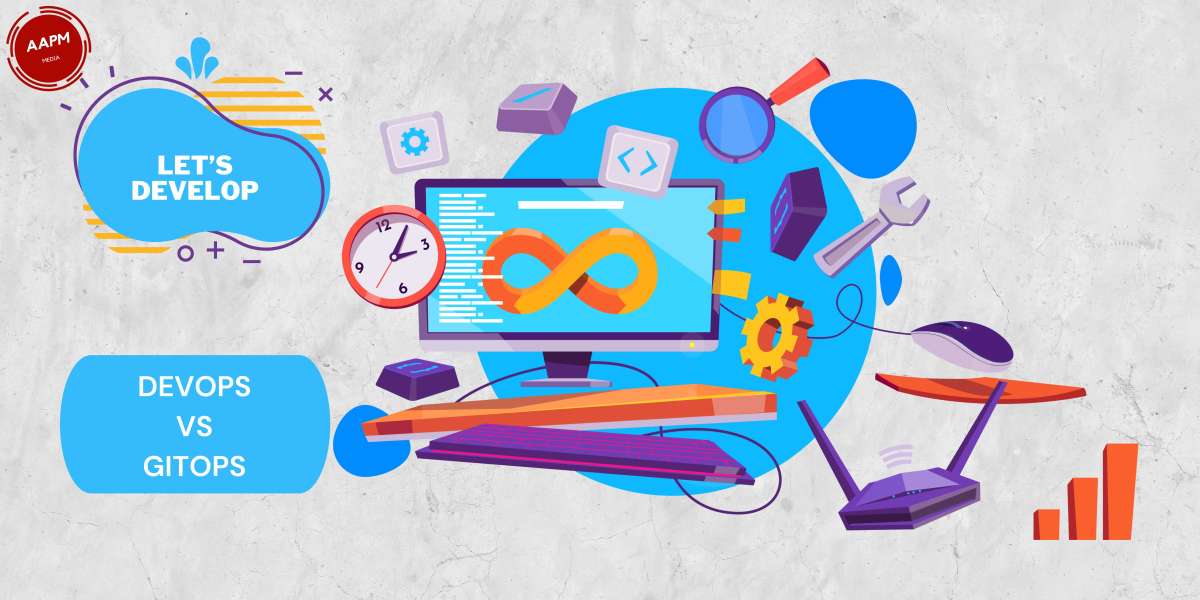What Is DevOps?
DevOps, short for Development and Operations, brings development, IT operations and QA teams together to streamline and automate the software delivery process. DevOps services aim to break down silos, foster continuous communication and automate manual processes to achieve faster and more reliable releases.
Key DevOps Principles
- Automation: The automation of repetitive tasks and manual processes accelerates the delivery pipeline and minimizes errors.
- Continuous Integration/Continuous Deployment (CI/CD): CI/CD pipelines automate the building, testing and deployment of code changes, enabling faster and more frequent releases.
- Monitoring and Feedback: Continuous monitoring of applications in production provides valuable feedback to improve performance, identify issues and enhance overall reliability.
The Rise of GitOps
GitOps is a recent concept that focuses on using Git as the single source of truth for infrastructure and application deployment. The GitOps model extends the principles of Infrastructure as Code (IaC) to the entire application delivery process, emphasizing declarative configurations and version-controlled workflows.
Key GitOps Principles
- Declarative Configuration: The GitOps model relies on declarative configurations stored in version-controlled repositories, providing a clear and auditable representation of the desired state.
- Git as the Single Source of Truth: All changes to the system are managed through Git repositories, ensuring consistency and traceability across environments.
- Automation through Operators: GitOps leverages operators and automated agents, to enforce the desired state specified in the Git repository, reducing manual interventions.
- Rollback and Rollforward: GitOps allows for easy rollback to previous versions in case of issues. This ensures a quick and reliable recovery mechanism.
GitOps vs. DevOps
GitOps and DevOps are both approaches to software development and operations, but they have some key differences in their focus, principles and practices. Here’s a brief differentiation between DevOps and GitOps. Now, lets discuss DevOps Solutions vs GitHub (GitOps)!
Purpose
- DevOps: DevOps focuses on the cultural and organizational aspects of collaboration between development and operations teams. It includes practices like continuous integration, continuous delivery (CI/CD), and automation of manual processes.
- GitOps: GitOps, on the other hand, focuses on the continuous delivery aspect and leverages Git repositories as the single source of truth for the infrastructure and application configuration.
Infrastructure as Code (IaC)
- DevOps: DevOps services often involve Infrastructure as Code (IaC) practices, where infrastructure configurations are defined programmatically. However, the emphasis is not exclusively on Git as the source of truth for the entire system.
- GitOps: GitOps relies heavily on IaC principles, where infrastructure and application configurations are stored as code in a Git repository. The Git repository is considered the source of truth for both the application code and the infrastructure.
Deployment and Synchronization
- DevOps: In traditional DevOps, deployment and synchronization of infrastructure and application changes may involve various tools and manual processes.
- GitOps: GitOps automates the deployment and synchronization process by continuously monitoring the Git repository for changes. When changes are detected, automated processes apply those changes to the target environment, ensuring that the actual state converges to the desired state declared in the Git repository.
The Final Touch
While DevOps is a broader cultural and collaborative approach encompassing various aspects of software development and operations, GitOps is a more specialized approach. It focuses specifically on using Git as the single source of truth for managing and automating operations, especially in the context of containerized and cloud-native applications. GitOps can be seen as a subset or an extension of DevOps, with a specific emphasis on Git and Infrastructure Software Delivery Automation.
While both GitOps and DevOps aim to enhance collaboration and streamline software delivery, they differ in their focus, principles and methodologies. DevOps provides a holistic approach to software development and operations, emphasizing collaboration and automation across the entire lifecycle.
On the other hand, GitOps narrows its focus to continuous delivery and deployment, leveraging Git as the single source of truth for configuration management. The choice between DevOps vs GitHub (GitOps) depends on the specific needs and goals of a development team. Many today are organizations extracting value by combining elements of both methodologies for a comprehensive and efficient software delivery process.
Why Choose OpsTree’s GitOps and DevOps Services?
If you want to revolutionize your software development lifecycle, look no further than OpsTree. Leverage the power of GitOps and DevOps consulting services to streamline development processes, enhance collaboration and boost overall efficiency.
- GitOps Mastery
Unleash the potential of GitOps with OpsTree’s expert guidance. From setting up Git repositories as your single source of truth to automating deployments and ensuring infrastructure-as-code (IaC) best practices, we navigate the GitOps landscape with finesse.
- DevOps Transformation
Transform your development pipeline with OpsTree’s comprehensive DevOps Consulting Services. Our seasoned professionals work alongside your team to implement continuous integration, continuous delivery (CI/CD) and automate manual processes, ensuring faster releases and heightened quality.
For More Info: Please Read Here







